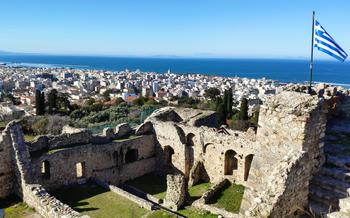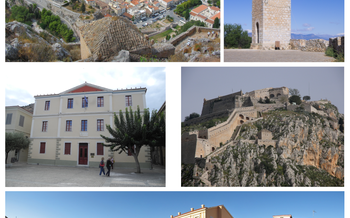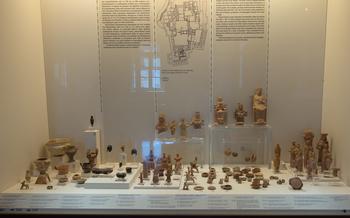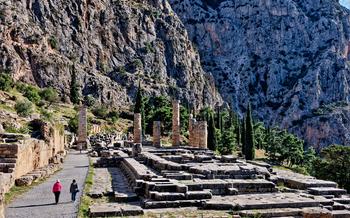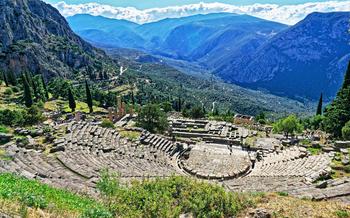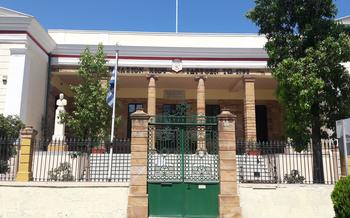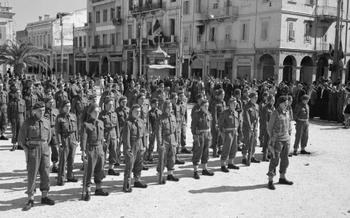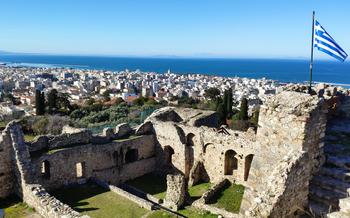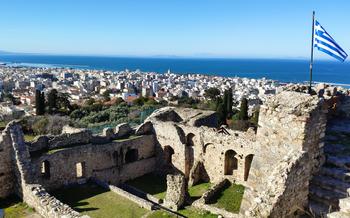
The Achaia Folklore Museum
- The Achaia Folklore Museum: An Overview
- Exploring the Museum's Collections
- Traditional Greek Costumes
- Handicrafts and Weaving
- Agricultural Tools and Implements
- Domestic Life and Household Items
- Religious Iconography and Artifacts
- Music and Dance Traditions
- Maritime History and Shipbuilding
- Temporary Exhibitions and Events
- Educational Programs and Workshops
- Museum Shop and Souvenirs
- Insider Tip: Hidden Gems of the Museum
The Achaia Folklore Museum: An Overview
The Achaia Folklore Museum, located in the heart of Patras, Greece, is a treasure trove of cultural heritage and traditions. Established in 1972, the museum is dedicated to preserving and showcasing the rich folklore of the Achaia region and beyond. Housed in a beautifully restored neoclassical building, the museum boasts a vast collection of artifacts, exhibits, and interactive displays that offer visitors a unique glimpse into Greek culture and history.
Conveniently situated near the city center, the museum is easily accessible by foot, public transportation, or car. Its elegant architectural style, characterized by intricate stonework, arched windows, and a spacious courtyard, adds to the charm and authenticity of the museum experience. The museum's operating hours and admission fees are designed to make it accessible to visitors from all walks of life, ensuring that everyone has the opportunity to delve into the fascinating world of Greek folklore.
Exploring the Museum's Collections
The Achaia Folklore Museum houses a diverse and captivating array of exhibits that provide a comprehensive insight into the rich cultural heritage of Greece. From traditional costumes and handicrafts to agricultural tools and religious artifacts, the museum's collections offer a tangible connection to the past.
Traditional Costumes: A vibrant display of regional costumes from across Greece showcases the diverse cultural traditions of the country. Detailed explanations accompany each costume, providing insights into their cultural significance, symbolism, and craftsmanship. Visitors can trace the evolution of Greek fashion through the ages, from ancient tunics to elaborate embroidered dresses.
Handicrafts and Weaving: The museum proudly exhibits traditional weaving techniques and tools, showcasing the intricate art of Greek craftsmanship. Handmade textiles, embroideries, and woven goods adorn the walls, each piece a testament to the skill and artistry of local artisans. Workshops and demonstrations provide visitors with an opportunity to learn about the processes involved in creating these beautiful textiles.
Agricultural Tools and Implements: A collection of traditional farming tools and equipment highlights the significance of agriculture in Greek history and culture. From simple hand tools to complex machinery, these exhibits illustrate the evolution of farming practices over time. Interactive displays engage visitors, allowing them to explore the techniques used by Greek farmers throughout the centuries.
Traditional Greek Costumes
At the Achaia Folklore Museum, visitors can marvel at a vibrant collection of traditional Greek costumes from across the country. Each costume is a testament to the cultural diversity and rich heritage of Greece, showcasing the unique designs and craftsmanship of different regions. Detailed explanations accompany each exhibit, providing insights into the cultural significance and symbolism behind the intricate patterns and embellishments.
From the flowing dresses and intricate embroidery of the Peloponnese to the colorful skirts and bodices of the Cyclades, the museum offers a glimpse into the evolution of Greek fashion through the ages. Visitors can learn about the traditional materials and techniques used to create these stunning garments, and appreciate the skill and artistry of the artisans who crafted them. The museum also hosts regular demonstrations and workshops, where visitors can witness firsthand the art of traditional Greek costume making and even try their hand at creating their own unique pieces.
Handicrafts and Weaving
The Achaia Folklore Museum proudly showcases the rich tradition of Greek handicrafts and weaving, offering visitors a glimpse into the skill and artistry of local artisans. Traditional weaving techniques, passed down through generations, are demonstrated using authentic tools and equipment. Visitors can admire the intricate patterns and vibrant colors of handmade textiles, embroideries, and woven goods, each piece a testament to the creativity and craftsmanship of Greek artisans. Workshops and demonstrations provide an opportunity to learn about the art of Greek weaving and witness the transformation of raw materials into beautiful creations. Whether it's the intricate designs of traditional costumes or the delicate embroidery on household linens, the museum's collection celebrates the enduring legacy of Greek craftsmanship.
Agricultural Tools and Implements
The Achaia Folklore Museum boasts an impressive collection of traditional farming tools and implements, offering a glimpse into the agricultural heritage of Greece. These artifacts showcase the ingenuity and resourcefulness of Greek farmers throughout history. From simple hand tools to intricate machinery, the collection provides insights into the evolution of farming practices over time.
Among the highlights are traditional plows, sickles, threshing machines, and irrigation systems. Each tool tells a story of the challenges and triumphs faced by Greek farmers in cultivating their land. Interactive exhibits allow visitors to experience the weight and feel of these implements, providing a hands-on understanding of the physical demands of agricultural work.
The museum also explores the significance of agriculture in Greek culture and history. Visitors can learn about the role of farming in shaping the Greek economy, society, and cuisine. Through informative displays and demonstrations, the museum celebrates the deep connection between the Greek people and their land.
Domestic Life and Household Items
The Achaia Folklore Museum offers a fascinating glimpse into the domestic life of Greek households from centuries past. The collection features a wide range of artifacts related to everyday life, providing visitors with a deeper understanding of the customs and routines of the Greek people.
Traditional cooking utensils, such as copper pots, wooden spoons, and ceramic bowls, offer insights into the culinary traditions of the region. Visitors can also learn about the evolution of Greek cuisine through interactive displays that showcase traditional recipes and cooking techniques.
The museum's collection of pottery and furniture provides a glimpse into the aesthetics and craftsmanship of Greek households. Handmade ceramic plates, jugs, and vases showcase the skill and artistry of local potters, while wooden furniture, often intricately carved and decorated, reflects the region's rich woodworking tradition.
Interactive displays on traditional Greek cuisine allow visitors to experience the flavors and aromas of Greek home cooking. Visitors can learn about the use of fresh, local ingredients, as well as the preparation and preservation techniques that have been passed down through generations.
Religious Iconography and Artifacts
The Achaia Folklore Museum houses a remarkable collection of religious iconography and artifacts that provide a glimpse into the rich spiritual heritage of Greece. Visitors can admire a diverse array of icons, each adorned with intricate details and vibrant colors, depicting scenes from the Bible and the lives of saints. These icons offer a profound insight into the symbolism and significance of religious imagery in Greek Orthodox culture.
The museum also showcases a collection of candles, ecclesiastical objects, and other religious artifacts that shed light on the evolution of religious practices and iconography over time. Workshops on icon painting and restoration are occasionally offered, providing visitors with an opportunity to learn about the techniques and skills involved in creating these sacred works of art. Whether you are a devout believer or simply fascinated by the beauty and symbolism of religious art, this collection is sure to leave a lasting impression.
Music and Dance Traditions
The Achaia Folklore Museum proudly showcases the rich musical heritage of Greece through its collection of traditional musical instruments and costumes. Visitors can embark on a journey of sound and rhythm as they explore the diverse musical traditions that have shaped Greek culture for centuries.
From the mournful strains of the lyra and the santouri to the lively melodies of the bouzouki and the clarinet, the museum's exhibits offer a glimpse into the soul of Greek music. Intricate costumes, adorned with vibrant colors and intricate embroidery, further enhance the immersive experience, providing a visual representation of the deep connection between music and dance in Greek culture.
The museum also delves into the significance of regional dances, highlighting their unique steps, rhythms, and cultural contexts. Whether it's the energetic kalamatianos from the Peloponnese or the graceful syrtos from the Aegean islands, each dance tells a story of tradition, community, and celebration.
To bring these traditions to life, the museum regularly hosts live performances and demonstrations by local musicians and dancers. These events provide visitors with an opportunity to witness the magic of Greek music and dance firsthand, immersing themselves in the vibrant energy and passion that define these cultural expressions.
Maritime History and Shipbuilding
Patras, a historic port city in Greece, proudly showcases its rich maritime heritage at the Achaia Folklore Museum. The museum features an array of exhibits that delve into the region's seafaring traditions and shipbuilding prowess. Model ships, intricately crafted with precision and attention to detail, transport visitors back in time to the era of wooden sailing vessels that once dominated the Mediterranean Sea.
Interactive displays provide an immersive experience, allowing visitors to explore the complexities of navigation, charting sea routes, and the tools used by skilled shipbuilders. Historical accounts of famous seafarers from the region, their voyages, and contributions to maritime history are vividly presented, shedding light on the adventurous spirit and maritime expertise that have shaped the identity of Patras.
The museum's collection also includes fascinating artifacts related to shipbuilding techniques, such as traditional tools, materials, and construction methods. Visitors can gain insights into the craftsmanship and ingenuity that went into building sturdy vessels capable of withstanding the challenges of the open sea.
Whether you're a history buff, a maritime enthusiast, or simply curious about the seafaring traditions of Greece, the Maritime History and Shipbuilding section of the Achaia Folklore Museum offers a captivating journey into the world of sailing, shipbuilding, and the rich maritime heritage of Patras.
Temporary Exhibitions and Events
The Achaia Folklore Museum regularly hosts temporary exhibitions and special events that delve deeper into specific aspects of Greek culture and heritage. These exhibitions may focus on a particular region, a specific craft or tradition, or a historical event. They often feature rare artifacts, interactive displays, and multimedia presentations that bring the past to life.
Some of the past temporary exhibitions have explored topics such as the history of Patras Carnival, traditional Greek embroidery techniques, and the role of women in Greek society. Visitors can expect to find a diverse range of exhibitions throughout the year, ensuring that there is always something new to discover at the museum.
In addition to exhibitions, the museum also hosts regular events such as lectures, workshops, and cultural performances. These events provide opportunities for visitors to engage with local experts, learn new skills, and experience Greek culture firsthand.
Whether you are interested in traditional crafts, history, or simply want to immerse yourself in the vibrant culture of Greece, the Achaia Folklore Museum's temporary exhibitions and events are not to be missed. For the most up-to-date information on upcoming events, be sure to check the museum's website or social media pages.
Educational Programs and Workshops
The Achaia Folklore Museum offers a range of educational programs and workshops designed to engage visitors of all ages in the exploration of Greek culture and traditions. These programs are tailored to suit the interests and needs of different groups, from school children to adults, and provide a unique opportunity for hands-on learning and cultural immersion.
One of the most popular workshops is the traditional weaving workshop, where participants can learn the art of Greek weaving using traditional looms and techniques. Under the guidance of experienced instructors, visitors can create their own unique woven textiles, such as rugs, bags, or scarves, while gaining insights into the symbolism and craftsmanship behind these intricate designs.
For those interested in culinary arts, the museum offers cooking workshops that focus on traditional Greek cuisine. Participants can learn to prepare classic dishes using fresh, local ingredients and discover the secrets of Greek culinary traditions. The workshops are led by experienced chefs who share their knowledge and expertise, ensuring that participants leave with a newfound appreciation for Greek gastronomy.
In addition to these hands-on workshops, the museum also organizes lectures, seminars, and cultural events throughout the year. These events provide opportunities for visitors to learn from experts in various fields, such as history, archaeology, anthropology, and folklore. The museum also collaborates with local artists and artisans to offer workshops on traditional crafts, such as pottery, wood carving, and jewelry making.
The educational programs and workshops at the Achaia Folklore Museum are an excellent way to delve deeper into Greek culture and traditions. They offer a unique and immersive experience that allows visitors to learn from experts, engage in hands-on activities, and create lasting memories of their visit to Patras.
Museum Shop and Souvenirs
The Achaia Folklore Museum houses a charming museum shop where visitors can purchase unique souvenirs and handcrafted items that celebrate the rich cultural heritage of Greece. From intricately woven textiles and embroideries to hand-painted pottery and traditional musical instruments, the shop offers a treasure trove of authentic souvenirs that make for meaningful gifts or personal mementos.
Support local artisans and preserve traditional skills by choosing handcrafted items made by skilled craftsmen and women from the region. Browse through a variety of ceramics, jewelry, woodwork, and leather goods, each piece showcasing the unique artistry and craftsmanship of the Greek people.
For those seeking a deeper connection to the museum's collections, the shop also offers a selection of books and publications that delve into the history, culture, and traditions of Greece. These books provide valuable insights into the exhibits and offer a lasting reminder of your visit to the Achaia Folklore Museum.
Insider Tip: Hidden Gems of the Museum
Beyond the main exhibits, the Achaia Folklore Museum holds a treasure trove of hidden gems waiting to be discovered by curious visitors. One such gem is the museum's extensive archive, which houses a vast collection of rare documents, photographs, and manuscripts related to the history and culture of Patras and the surrounding region. Visitors with a keen interest in local history can request access to the archives and delve into the fascinating stories and events that have shaped this vibrant city.
Another hidden gem is the museum's research library, which contains a wealth of books, journals, and articles on Greek folklore, ethnography, and traditional arts. Whether you're a researcher, a student, or simply someone with a thirst for knowledge, the library offers a quiet and conducive environment for exploration and learning.
To make the most of your visit, don't hesitate to engage with the museum's friendly staff and volunteers. They are a fountain of knowledge and can provide personalized guidance and insights into the museum's collections and hidden treasures. They can also share fascinating anecdotes and stories about the artifacts and their significance, bringing the museum's exhibits to life in a truly unforgettable way.
